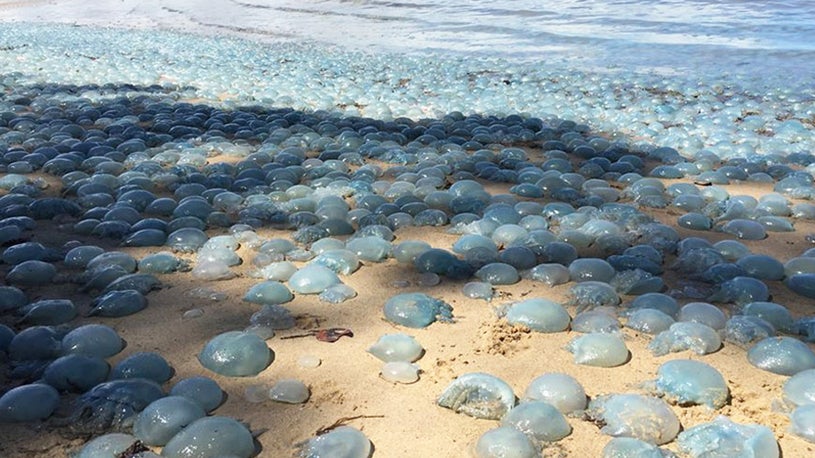In a stunning display of nature’s unpredictability, hundreds of jellyfish have taken over an Australian beach, creating a mesmerizing yet perplexing scene for locals and tourists alike.

A Jellyfish Takeover
In mid-August 2024, visitors to Bondi Beach in Sydney were greeted by an unexpected sight—a beach blanketed with hundreds of jellyfish. The creatures, known for their ethereal beauty and stinging tentacles, covered large sections of the sand and shallow waters, creating a surreal and colorful spectacle.
“It was unlike anything I’ve ever seen,” said beachgoer Amy Chen. “The entire shoreline was filled with jellyfish, turning the beach into a jellyfish paradise.”
Details of the Invasion
The jellyfish, primarily of the species Pelagia noctiluca (commonly known as the Mauve Stinger), were found washed up on the beach due to strong ocean currents and recent storms. The invasion appeared to be a result of unusual weather patterns and changes in sea temperatures, which have affected the jellyfish’s migration and breeding patterns.
Image: Close-up of the jellyfish that washed ashore.
The mass stranding is believed to have been caused by a combination of factors, including increased sea temperatures and changes in ocean currents, which can displace jellyfish from their typical habitats.
Theories and Speculations
While the jellyfish invasion is primarily seen as a natural event, some locals have speculated about potential connections to climate change or environmental shifts. Experts, however, suggest that such occurrences are part of natural cyclical patterns in marine environments.
“Jellyfish blooms can be influenced by a variety of environmental factors,” explained Dr. Sarah Lee, a marine biologist. “While this event is dramatic, it’s not entirely out of the ordinary for jellyfish populations to experience such large-scale movements.”
Local Reactions
The jellyfish invasion has drawn a mix of fascination and concern from the public. Beachgoers have been taking photographs and videos of the spectacle, while local authorities have been advising people to avoid contact with the jellyfish due to their stinging capabilities.
“It’s a beautiful but tricky situation,” said local lifeguard Tom Harris. “The jellyfish are fascinating to look at, but people need to be cautious and not touch them.”
Scientific Interest
Researchers are taking the opportunity to study the jellyfish bloom and its implications for marine ecosystems. They are analyzing the conditions that led to the mass stranding and exploring the potential impacts on local marine life.
“This is an important event for us to study,” Dr. Lee added. “Understanding the factors behind jellyfish blooms can help us better manage and protect marine environments.”
Public and Media Attention
The jellyfish invasion has garnered significant media coverage and sparked widespread interest on social media. The striking images and unusual nature of the event have captivated audiences and contributed to ongoing discussions about marine phenomena.
“It’s amazing how a natural event like this can capture so much attention,” said journalist Rachel Adams. “The jellyfish invasion has become a popular topic, and people are fascinated by the sheer scale of it.”
Future Developments
As scientists continue to investigate the jellyfish invasion, updates on the situation and any new findings will be shared with the public. The event serves as a reminder of the dynamic and sometimes unpredictable nature of marine environments.
“We’ll keep monitoring the situation and provide more information as it becomes available,” Dr. Lee concluded. “It’s a unique opportunity to learn more about these incredible creatures and their behavior.”
Conclusion
The invasion of hundreds of jellyfish at Bondi Beach is a stunning and unusual event that highlights the fascinating and sometimes unpredictable aspects of nature. As the story unfolds, it underscores the beauty and complexity of marine ecosystems and the need for ongoing scientific inquiry.
Stay tuned to unbelievable.lol for more strange and unbelievable news stories from around the globe. Because sometimes, reality is more astonishing than fiction.
